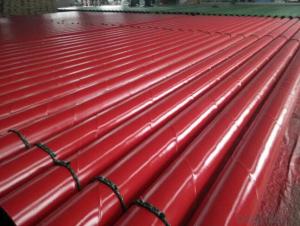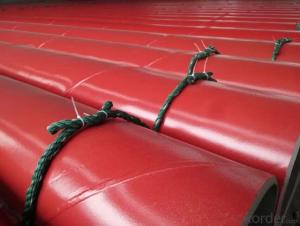seamless and welded 2PE steel pipe external coating
- Loading Port:
- China Main Port
- Payment Terms:
- TT OR LC
- Min Order Qty:
- -
- Supply Capability:
- -
OKorder Service Pledge
OKorder Financial Service
You Might Also Like
Specifications
water pipeline inner-layer tape
1 Butyl rubber as adhesive
2. SGS test report and DVGW certificate
3. corrosion protection
water pipeline inner-layer tape
State-of-the-Art Pipeline Protection for All Climates & Environments
System description:
WATER PIPELINE Inner -layer tape also be called pipe wrap anti-corrosion tape, polyethylene wrap tape.
water pipeline Inner-layer tapeT100 is engineered to assure a high bond to the primed pipe surface with excellent conformability characteristics, aggressive adhesive for corrosion protection and repair of main line coatings.
Inner-layer tapeT100 series is cold applied tape coating system for corrosion protection of Oil, Gas, Petrochemical, and Waste Waterburied pipeline, pipe can be buried, also can be underground ,overhead ,onshore and offshore .
Structure of water pipeline inner wrap tape
The specification of the tape consists of two layers, adhesive layer and film backing
Adhesive: butyl rubber
Film backing: Special blend of stabilized polyethylene
Features & Benefits
Provides a permanent bond to the primed steel pipes surface and provides protection against chemical electrolytic corrosion for underground pipelines.
long term corrosion protection
Worldwide reference lists. Established in-ground history
High chemical resistance under service temperature.
Outstanding electric property and permanent adhesion.
Cold applied, No release liner. Makes installation fast and easy.
Complies with EN-DIN 30672 and AWWAC-214 international standards and also ASTM standards.
Be used for water pipeline corrosion protection
System Properties
Type | T138 | T 150 | T165 | T180 | T 250 | T265 | T280 | |
Thickness | 15mil 0.38mm | 20mil 0.508mm | 25mil 0.635mm | 30mil 0.762mm | 20mil 0.508mm | 25mil 0.635mm | 30mil 0.762mm | |
Backing | 9mil 0.229mm | 9mil 0.241mm | 10mil 0.25mm | 10mil 0.25mm | 15mil 0.38mm | 20mil 0.508mm | 25mil 0635mm | |
Adhesive | 6mil 0.152mm | 11mil 0.279mm | 15mil 0.381mm | 20mil 0.508mm | 5mil 0.127mm | 5mil 0.127mm | 5mil 0.127mm | |
When used for ductile iron pipes inner layer 980-20 or 980-25 and outer layer 955-20 or 955-25 are recommended. | ||||||||
Elongation | ³300% | ³400% | ||||||
Tensile Strength | 55 N/cm | 70 N/cm | ||||||
Color | Black | White | ||||||
Peel Adhesion to Primed Pipe | 33 N/cm | |||||||
Dielectric Strength | 30 KV | |||||||
Dielectric Breakdown | 26 KV/mm | |||||||
Cathodic Disbandment | 0.24 in radius 6.4 mm | |||||||
Water Vapor Transmission Rate | < 0.1% | |||||||
Volume Resistivity | 2.5 x 1015 ohm.cm | |||||||
Impact resistance | 5.5Nm | |||||||
Penetration Resistance | <15% | |||||||
Performance | AWWA C-209,ASTM D 1000,EN 12068 | |||||||
Order information
Length | 100ft(30 M),200ft(60 M),400ft(120 M),800ft(240 M) |
Width | 2’’(50mm),4’’(100mm),6’’(150mm),17’(450mm),32’’(800mm) |
- Q:What are the limitations of using steel pipes?
- There are several limitations to using steel pipes in various applications. Firstly, steel pipes can be quite expensive compared to other materials such as plastic or copper. This cost factor can be a significant limitation for projects with tight budgets. Secondly, steel pipes are susceptible to corrosion. Over time, exposure to moisture and certain chemicals can cause steel pipes to rust and deteriorate. This can lead to leaks, reduced structural integrity, and ultimately, the need for costly repairs or replacement. Another limitation of steel pipes is their weight and rigidity. Steel pipes are generally heavier and less flexible than other types of pipes, making them more challenging to install and maneuver in certain settings. Additionally, their rigid nature makes them less suitable for applications that require significant movement or flexibility. Furthermore, steel pipes can be prone to thermal expansion and contraction. When exposed to extreme temperatures, steel pipes can expand or contract, potentially causing stress on joints, fittings, or other components. This can lead to leaks or even pipe failure if not properly accounted for. Lastly, steel pipes are not as resistant to certain chemicals or substances as other materials. Some chemicals can corrode or erode the inner lining of steel pipes, compromising their integrity and potentially causing contamination or leakage. While steel pipes have many advantages, it is important to consider these limitations when deciding on the most suitable material for a specific application.
- Q:What is the fatigue strength of steel pipes?
- The fatigue strength of steel pipes refers to the maximum stress level that the pipes can endure without experiencing fatigue failure or damage over a given number of stress cycles. It varies depending on factors such as the steel composition, manufacturing process, pipe dimensions, and environmental conditions.
- Q:What are the common applications of steel pipes in industrial settings?
- Steel pipes are commonly used in industrial settings for various applications such as transporting fluids and gases, providing structural support in construction projects, conveying materials in manufacturing processes, and facilitating the distribution of water, oil, and gas in pipelines.
- Q:What's the difference between stainless steel seamless tube and stainless steel welded pipe?
- Stainless steel seamless pipe featuresFirst, the product of the wall is thicker, it is more economical and practical, the wall thickness of the thinner, processing costs will be substantially increased it; secondly, the product process to determine its performance limitations, generally low precision seamless steel pipe: uneven thickness, tube inner surface brightness low and high cost of fixed length, and the inner surface pitting and black spots difficult to remove; the detection and plastic third, must be processed offline. Therefore, it has its advantages in high pressure, high strength, mechanical structure and timber.
- Q:Can steel pipes be used for brewery installations?
- Indeed, brewery installations can utilize steel pipes. Within breweries, steel pipes are frequently employed for a multitude of purposes, including fluid transfer, equipment interconnection, and plumbing system establishment. Steel pipes boast exceptional durability, strength, and resistance to corrosion, rendering them apt for handling the challenging conditions and high-pressure environments typically encountered in brewery installations. Moreover, the ability to weld steel pipes together enables seamless connections, guaranteeing a dependable and leakage-free operation. Nevertheless, it remains crucial to ensure that the steel pipes employed in brewery installations comply with the requisite standards and regulations, thereby safeguarding the safety and quality of the beer production process.
- Q:How are steel pipes used in the manufacturing of power distribution systems?
- Steel pipes are commonly used in the manufacturing of power distribution systems as they provide a reliable and durable solution for transporting and protecting electrical cables. They are used to create conduits that house the cables, ensuring safe and efficient transmission of electricity throughout the system. Steel pipes also offer resistance to corrosion, fire, and extreme weather conditions, making them a suitable choice for power distribution systems.
- Q:How do steel pipes compare to other materials, such as PVC or copper?
- Steel pipes are generally more durable and have a higher resistance to heat, pressure, and corrosion compared to PVC or copper pipes. They are commonly used for applications that require strength and longevity, such as in industrial settings or for transporting high-pressure fluids. However, steel pipes can be more expensive and heavier than PVC or copper, making them less suitable for certain residential or lightweight applications. Ultimately, the choice of material depends on the specific requirements and budget of the project.
- Q:How are steel pipes used in the manufacturing of food processing equipment?
- Steel pipes are commonly used in the manufacturing of food processing equipment due to their durability, strength, and resistance to corrosion. These pipes are used to transport various food products such as liquids, powders, and gases within the equipment. They are also utilized in the construction of frames, supports, and structures for food processing machinery, ensuring stability and longevity. Additionally, steel pipes are often employed in the creation of heat exchangers, which are crucial for heating or cooling purposes in food processing equipment.
- Q:How are steel pipes tested for leaks?
- Steel pipes are tested for leaks using various methods, including hydrostatic testing and ultrasonic testing. In hydrostatic testing, the pipes are filled with water or another suitable fluid and subjected to high pressure to check for any leakage. Ultrasonic testing involves using high-frequency sound waves to detect any defects or leaks in the pipes. These testing methods ensure the integrity and reliability of steel pipes.
- Q:What are the different methods of protecting steel pipes from corrosion?
- There are several methods of protecting steel pipes from corrosion, including: 1. Coatings: Applying protective coatings such as epoxy, polyethylene, or zinc to the surface of the steel pipes can create a barrier against corrosive elements. 2. Cathodic Protection: This method involves installing sacrificial anodes or impressed current systems to provide a protective current that counteracts the corrosion process. 3. Corrosion Inhibitors: Adding chemicals or inhibitors to the fluid or environment surrounding the pipes can reduce the rate of corrosion. 4. Internal Linings: Applying internal linings made of resin, cement, or other materials can protect the inner surface of the pipes from corrosion caused by the transported fluid. 5. Design Considerations: Implementing proper design practices like avoiding sharp bends and crevices, ensuring proper drainage, and using corrosion-resistant alloys can help prevent corrosion in steel pipes.
1. Manufacturer Overview |
|
|---|---|
| Location | |
| Year Established | |
| Annual Output Value | |
| Main Markets | |
| Company Certifications | |
2. Manufacturer Certificates |
|
|---|---|
| a) Certification Name | |
| Range | |
| Reference | |
| Validity Period | |
3. Manufacturer Capability |
|
|---|---|
| a)Trade Capacity | |
| Nearest Port | |
| Export Percentage | |
| No.of Employees in Trade Department | |
| Language Spoken: | |
| b)Factory Information | |
| Factory Size: | |
| No. of Production Lines | |
| Contract Manufacturing | |
| Product Price Range | |
Send your message to us
seamless and welded 2PE steel pipe external coating
- Loading Port:
- China Main Port
- Payment Terms:
- TT OR LC
- Min Order Qty:
- -
- Supply Capability:
- -
OKorder Service Pledge
OKorder Financial Service
Similar products
New products
Hot products
Related keywords






























